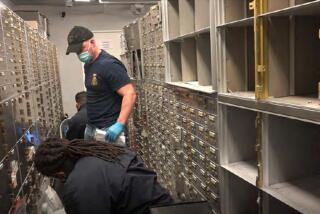High Court Gets Tough on Obscenity : Ruling: The justices let stand the forced closure of adult bookstores and video shops in Virginia.
WASHINGTON — The Supreme Court boosted the federal government’s crackdown on obscenity today as it let stand the forced closing of three adult bookstores and nine video rental shops in Virginia.
The court, over one dissenting vote, rejected arguments by the businesses’ owners, who were convicted of racketeering and selling obscene materials, that the subsequent seizures of the businesses violated their free-speech rights.
Justice Byron R. White voted to hear arguments in the case, but four votes are needed to grant such review.
The seizures were carried out under provisions of the federal Racketeer Influenced and Corrupt Organizations Act, or RICO. Those convicted of participating in an enterprise through a pattern of racketeering may be forced to forfeit all assets and proceeds stemming from the illegal activity.
The justices were told that the Virginia case is the first prosecuted under RICO in which the racketeering activity charges were based entirely on obscenity crimes.
Obscenity was added in 1984 to the long list of underlying crimes on which a RICO prosecution could be based.
“The court’s determination of the validity of post-judgment forfeiture in this case will have enormous impact upon the future of RICO obscenity prosecutions, both state and federal,” lawyers for the convicted business owners said.
Dennis and Barbara Pryba, owners of the corporations that operated the bookstores and video shops in northern Virginia, were convicted of selling and distributing obscene magazines and videotapes worth about $105.
An employee, Jennifer Williams, also was convicted on obscenity charges.
Dennis Pryba was sentenced to three years in prison and five years probation, and was fined $75,000. Barbara Pryba was given a suspended prison sentence and fined $200,000. Williams was given three years probation and fined $2,250.
One of the corporations the Prybas owned also was fined $200,000.
After a separate jury trial, a federal judge ordered that all assets--including corporate stock, inventory, bank accounts, automobiles and office furniture--be forfeited.
The convictions and forfeiture order was upheld by the U.S. 4th Circuit Court of Appeals last April.
In the appeal acted on today, lawyers for the Prybas and Williams argued that forfeiture of businesses engaged in constitutionally protected activities--the distribution of materials not found to be obscene--amounts to an impermissible “prior restraint” of speech.
“Although obscenity itself is a crime, a past finding of obscenity has never, in this court’s view, justified a ban on further communicative offerings,” the appeal said.
The Bush Administration urged the justices to reject the appeal.
More to Read
Sign up for Essential California
The most important California stories and recommendations in your inbox every morning.
You may occasionally receive promotional content from the Los Angeles Times.









